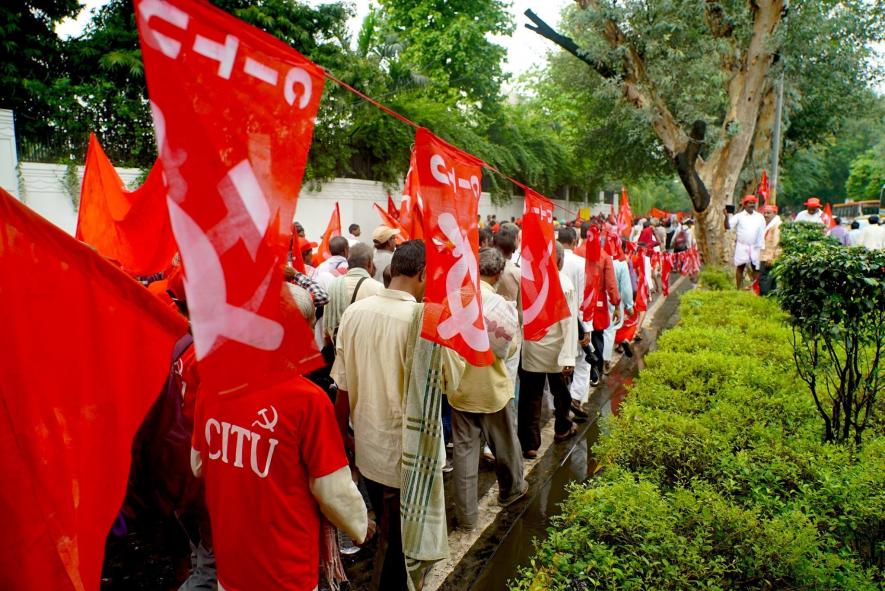Enough is Enough, Say Rallyists On Vanishing Jobs, Poor Crop Returns

Public sector employees, farmers, mining workers and contractual workers have challenged the Modi government by gathering in thousands on Parliament Street in the national capital, just around two kilometre away from Indian Parliament. They raised their voice against rampant privatisation of government sectors and its policies allegedly aimed at benefiting big corporate houses.
The protestors – who came from across the country – said in clear terms that ‘enough is enough’ and if the Centre still turned a deaf ear to their demands, it would have to bear the brunt in the general elections to be held in 2019.
Bundel Singh, who traveled to the Capital from Patiala in Punjab, alleged that the Prime Minister Narendra Modi-led Bharatiya Janata Party (BJP) government in the Centre had sold its conscience to industrialists and was going for rampant privatisation of electricity boards, education, sanitation, roadway services, Public Works Department (PWD), etc.
“Government jobs are vanishing as a result of mindless privatisation of public sector units. With private companies taking over government sectors, permanent jobs are decreasing and exploitation of workforce at the hand of private firms was rampant,” he told Newsclick on the sidelines of the massive Mazdoor Kisan Sangharsh Rally, organised by the Centre of Indian Trade Unions, All India Kisan Sabha and the All India Agricultural Workers Union..
Singh, who came here under the banner of joint forum of government employees of the state, claimed 70% of jobs had vanished.
Asked if majority of the ‘vanished’ jobs that he mentioned come under the state government, Balvendra Singh, who belongs to the same forum, said, “Both Congress and BJP are involved in this. Our delegation met the state government on several occasions, but they pass the buck to the Centre.”
The issue was elaborated by Umesh Chand, vice president of Maharashtra’s All State Government Employee Federation, who said around 15,000 graduates and post-graduates were working in organised government sectors across the state on contractual basis and are not paid even the minimum wage. “They are forced to work on Rs 5,000 to Rs 10,000,” he said, demanding that the contractual system must be withdrawn.
Talking about the National Pension Scheme (NPS), he alleged that it was also an attempt to benefit corporate houses. Under this scheme, employees are supposed to contribute 10% of their monthly salary and the same amount is contributed by the government. The sum of contribution is invested in the share market, which entails risk. Also, the NPS does not give assured returns post-retirement, unlike the earlier pension scheme. “Ultimately, the amount will be given to big industries because they are in the share market. Therefore, it is an attempt to give them an indirect profit. Secondly, there is no guarantee of profitability in the stock market. In case, the share prices fall, the government buying also goes down. As a result, the employees have to bear the losses,” he said.
In addition, he said, the government was trying to exploit people by introducing new labour laws in the private sector. “Employees are expected to work for 12 hours on less salary and there is no job security,” he added.
Public sector neglected
Instead of strengthening public sector companies, he alleged that the government was pushing private sector firms by giving them loans that turn into NPAs (non performing assets).
“Adani was given a loan of Rs 57,000 crore by the Reserve Bank of India (RBI) for coal mining in Australia at an interest rate of just 1%. Tata was given a loan of Rs 1,200 crore for its Nano project in Gujarat also at the rate of 1%. Laxmi Mittal was given a loan for its project in Punjab’s Bhatinda at the rate of 1%. All this shows that the government has sold its conscience. All such big industrialists are given a loan waiver, but the government does not have money to implement the Swaminathan committee report on farm distress. At least 9,000 farmers have committed suicide in Maharashtra following crop failures. But the government appears to be least bothered,” he added.
He said all employees of the state government went on strike on August 7, 8 and 9 which was called off after a series of negotiations but not a single promise made by the government had so far been implemented.
Sanchar Nigam Executives’ Association – a union of Bharat Sanchar Nigam Limited (BSNL) employees in Haryana – alleged that the public sector telecom company was now being run by the Ambanis. “BSNL cannot bring down its call rates even by 50 paise but private companies, such as Jio, have been given a free hand. They have brought call data charges so low that no public sector telecom company can compete with them. This is affecting our customer base and therefore the company is running huge losses,” Arvind Pal Dahiya, deputy manager of the association, told Newsclick.
He said no one in his department had got a pay hike and whenever they demand, they are told that the BSNL has been running losses.
Criticising the argument of loss and profitability, he said, “This is baseless. All private sector telecom operators have taken loans from banks which will be turned into NPAs one day. But we being the public sector company cannot take such loans from public sector banks. You (the government) argue that the BSNL is incurring loss but are not taking any remedial measures. You don’t have any plan to compete with the private players. Then, how will the situation improve?” he asked.
Cotton farmers’ woes
Rampal and Dharampal – farmers who had come from Bardah in Haryana’s Charkhi Dadri – said they had still not got minimum support price (MSP) for their cotton crop. When they go to sell their crops in the market, they end up selling it to private people at lower cost because the government does not purchase it everyday.
While the government rate of cotton is Rs 5,000 per 100 kg, the market rate is Rs 3,800 per 100 kg. Despite knowing that selling their crop on market will cause them loss, they are forced to do it as the government does not purchase it everyday. “If we want to sell it to mandi, we will have to wait, which we cannot afford,” they said.
They said the investment on crop is skyrocketing because of the implementation of new tax policy. “For the first time in 70 years, tax have been imposed on agricultural equipment. Buying pesticides has also been brought under the tax net. Because of the hike in diesel prices, irrigation has become a difficult task. After so much of investment, labour and living under the constant fear of crop failure, we get nothing. This is why farmers are committing suicide,” he explained.
The average cotton production per hectare is six quintals per hectare if everything is fine, he said giving details of the expenditures. “The average expenditure on seeds is Rs 8,000 to sow the crop on one hectare of land. Fertilisers cost around Rs 4,000-5,000. At least Rs 5,000-7,000 have to be spent on pesticides. Labour cost, transportation and expenditure on irrigation are in addition. But the return we get is nothing,” he claimed.
Fasal Bima Yojana not working
Asked about the Pradhan Mantri Fasal Bima Yojana (PMFBY), a government-sponsored crop insurance scheme that claims to integrate multiple stakeholders on a single platform, Rampal said it was against farmers’ interests. “Private companies have been given the contract of survey of the crop failure so that the claimed loss be paid to the farmers as per the report submitted by the surveyors. These companies do not proper survey. They consider entire block as one unit and acknowledge the losses in case of 100% failure of crops in the unit which do not happen generally. Individual loss is not counted by them,” he said.
The agriculture department had conducted a survey of crop failures in three districts of Haryana – Bhiwani, Charkhi Dadri and Sirsa – in October last year. It estimated a loss of Rs 290 crore but the surveying company is not accepting the report arguing that their estimation is not matching with its satellite data. As a result, farmers have not so far been paid that amount, said Rampal.
“Under the PMFBY, Rs 2,000/hectare is deducted from our bank account. The state and the Central government pays the double of what we give. All this amount goes to private insurance company, which is supposed to give us claims. They are taking money from us but not giving claims,” Dharampal alleged.
If the situation does not improve and the government does not wake from slumber, he threatened – it will have to face consequences in 2019.
Get the latest reports & analysis with people's perspective on Protests, movements & deep analytical videos, discussions of the current affairs in your Telegram app. Subscribe to NewsClick's Telegram channel & get Real-Time updates on stories, as they get published on our website.























